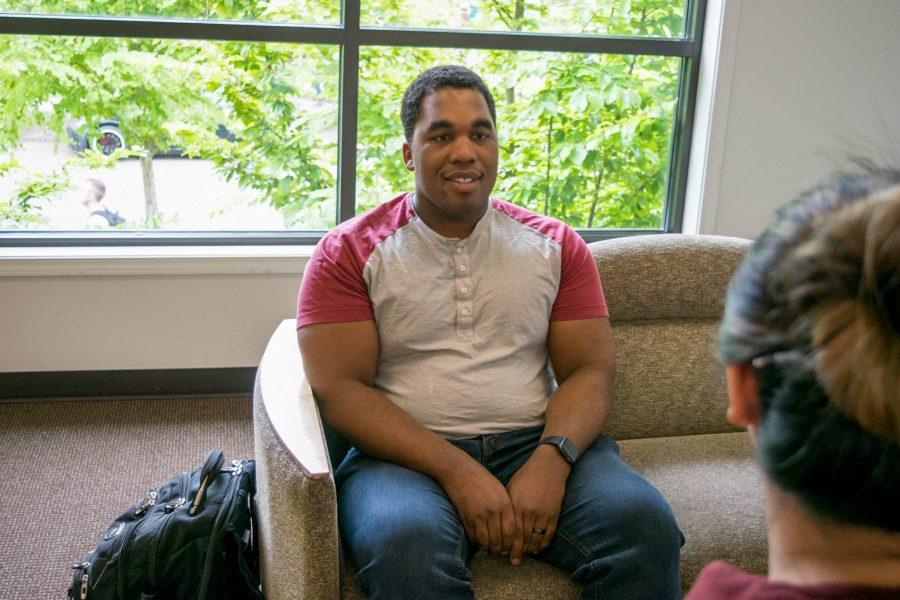By Jenn Tran and Sydney Lim | Staff Reporters
English literature major Sean Im came to SPU his freshman year to study biology, with the intention of going down the path of pre-med.
“I knew that if I were to choose pre-med, I needed to commit to science early on into college. I switched majors because I felt apathetic towards the classes I was taking,” Im said.
Although he had not given the STEM field his best effort, Im says that he “did enough” to know that he did not enjoy it. Im changed to the humanities route after realizing that he enjoyed reading and discussing what he had read.
Im remembers his first English as a second language teacher, Ms. Wilcox, who taught him after he first moved to the United States. Her patience and graciousness in helping him learn this language, resulting in his passion for reading.
“She also allowed me to keep up with my courses and not have to repeat a grade due to a language barrier. I am indebted to her,” Im said.
While SPU’s student population is female-dominated, with men making up 33 percent of the population and women making up 67 percent, the humanities have long been a female-dominated department.
According to the Humanities Indicators Project of the American Academy of Arts & Sciences, women were the minority recipients of doctoral degrees in the mid 1960s. Although they were best represented in humanities compared to any other field, women still received only 19 percent of humanities doctorates in 1966.
Since the 1960s, the percentage of doctorate degrees awarded to women has increased, and by the late 1990s, the majority of humanities doctorate degrees were awarded to women.
The amount of advanced humanities degrees awarded to women peaked within the first decade of the 21st century, and continued to increase within the later decade. As of 2015, women have earned 61 percent of all master’s degrees and 54 percent of all doctoral degrees in humanities.
Im, however, feels relatively indifferent to SPU’s gender ratio.
“I am aware of it and see evidence of it, but it does not affect me in any notable way consciously,” he said.
Im mentioned this to be a result of his upbringing, growing up with his older sister, as well as his current housing situation in which he is the only male.
Although he recognizes that he may have a different comfort level around women than most males, Im finds that being a man on a female dominated campus “is not the minority experience that sticks out” to him.
Some may think that being part of the gender minority may have its disadvantages, but Im believes that his work in the English major has not been affected by his gender; he is not discriminated against, and has not been called upon to be a token representative of men.
“I’m sure that my writing has a bias towards the male perspective due to my life experience, but that bias would exist regardless of the gender ratio,” Im said.
He also stresses the importance of diversity in perspectives in any classroom, regardless of the field.
“I think it is important to have a diverse range of voices in any classroom setting. People from different backgrounds have so many different points of views to offer, and in English especially, that is essential in gaining a wider perspective about a text,” he said.
When asked about advice for future male English majors who may be worried about the gender ratio, Im rolled his eyes and sarcastically asked, “Does the gender ratio change your ability to read or write?”
Ernest Thomas, a sophomore who also studies English, echos Im’s perspective, but from a perspective in education.
“The education field doesn’t have a wide range of representation for numerous reasons, but being a black man myself, I felt that there was not enough representation of male or ethnic diversity in the education career field,” Thomas said.
When kids see representation of different genders and ethnicities, Thomas believes they will see more possibilities in careers they can pursuit besides those that “focus on fame and wealth,” he added.
Thomas believes that studying in a female-dominated field has strengthened him, rather than negatively affected him.
“It has strengthened me knowing I have many different female leaders and role models to look up to in a female dominated career field,” he said. “I just hope I can live up to the responsibilities of being an educator and contribute to the community in meaningful and thoughtful ways,” he added.
Thomas wants to encourage incoming students who are interested in the humanities field to “look past the income, the stereotypes implied in that field” and to look internally, to their own passions and skills. He urges them to think about their lives at school, and to take notice of the lack of representation they have had.
“Some children come from many different environments and have someone in a position of teaching them that also represent their own ethnicity can really impact their future goals and decisions,” he said.
Thomas believes that no matter what career one chooses pursue, one needs to make sure it is something that they are passionate about and not simply because it yields more profit.
While the department of humanities is a female heavy field, SPU’s second most popular undergraduate program, nursing, is another female dominated department.
The bachelor’s degree in nursing at SPU is accredited by the Commission on Collegiate Nursing Education.
For 20-year-old Daniel Buenaventura, who switched from a psychology major to the nursing program during his first year, the massive gender difference is hardly noticeable.

Daniel Buenaventura hardly noticed the gender gap in nursing at first.
“I wanted to do something that was a lot more hands on, so I decided to switch,” Buenaventura explained. “It was a pretty easy transition because my brother was special needs and we had nurses come to our house every single day to take care of him, so I kinda grew up around nurses.”
Based on the March 2015 data from The Kaiser Family Foundation, the ratio of females to males in nursing is 9.5 to 1, and there are currently 3,176,295 registered female nurses compared to 335,611 registered male nurses in the United States.
Buenaventura says that the unbalanced gender ratio in his major is something he is already used to but does not think it is a big deal.
“I think having a lot of guy nurses is really cool, because you don’t see a lot of that,” Buenaventura said. “A lot of the guy nurses that I met have been really cool, because it’s a major not a lot of them choose. So the ones that do choose it have a really specific reason that they want to do it.”
Sophomore Mark Bueno, who is also a nursing student, has plans of joining the navy after graduation. Bueno chose nursing because of his love of helping others and his interest in the medical field.
When Bueno was in the seventh grade, he joined the United States Naval Sea Cadet Corps. One of his most memorable experiences in the program was helping to carry a friend on a stretcher as a training exercise.
“From there, I got to interview a navy corpsman, and he suggested studying nursing,” Bueno said.
Bueno mentions that SPU’s female dominance was mainly a challenge during the first day of school and lab.
“I vividly remember in both chemistry labs that I took last year I would always be a bit early and take the first seat available,” he said. “I remember everyone else filing in and only the last person to show up would sit next to me. I felt like everyone already knew each other and already paired up before the lab had even started.”
However, Bueno emphasizes that this became less this became a challenge the more nursing-oriented classes he took.
“I got to know my classmates better and felt less alienated,” he said.
Bueno believes it is important to have male representation in the nursing field because men typically are expected to not express a caring nature, and he wants to express this nature in his career path.
Although he still thinks about what it would be like to study in a field such as engineering or computer science from time to time, Bueno always knew that nursing would be his passion.
“I even convinced myself that if I did go into the engineering field, I would probably go back to college after a few years and still get a nursing degree,” he said
Geoffrey Lui, another student in the nursing program, wants to become a nurse so he can help non-English speaking immigrants communicate better with their doctors. He also hopes to work in medical missions. He wants to do this because all his extended family can’t speak English very well, and when visiting the doctor, it is very difficult for them to get the best care that they can.
For Lui, the lopsided gender ratio was expected, because he already knew that SPU had more girls than guys.
While there may be more females than males in the nursing program, both Buenaventura and Lui have passion for their career and have bright futures as nurses since they were recently accepted to the SPU nursing program.
“The gender ratio definitely affected me when I was taking prerequisite courses, since many of the girls study together; it was more difficult to me to get closer to them,” he explained. “I’m a little nervous when I wonder about the team dynamic in the nursing program now that I have been accepted, but I’m positive that things will work out.”
Im, Thomas, Buenaventura, Bueno, Lui and many other males in female-dominated majors have hope that potential employers in the future will employ them based off of their talents and qualifications rather than gender.

















































































